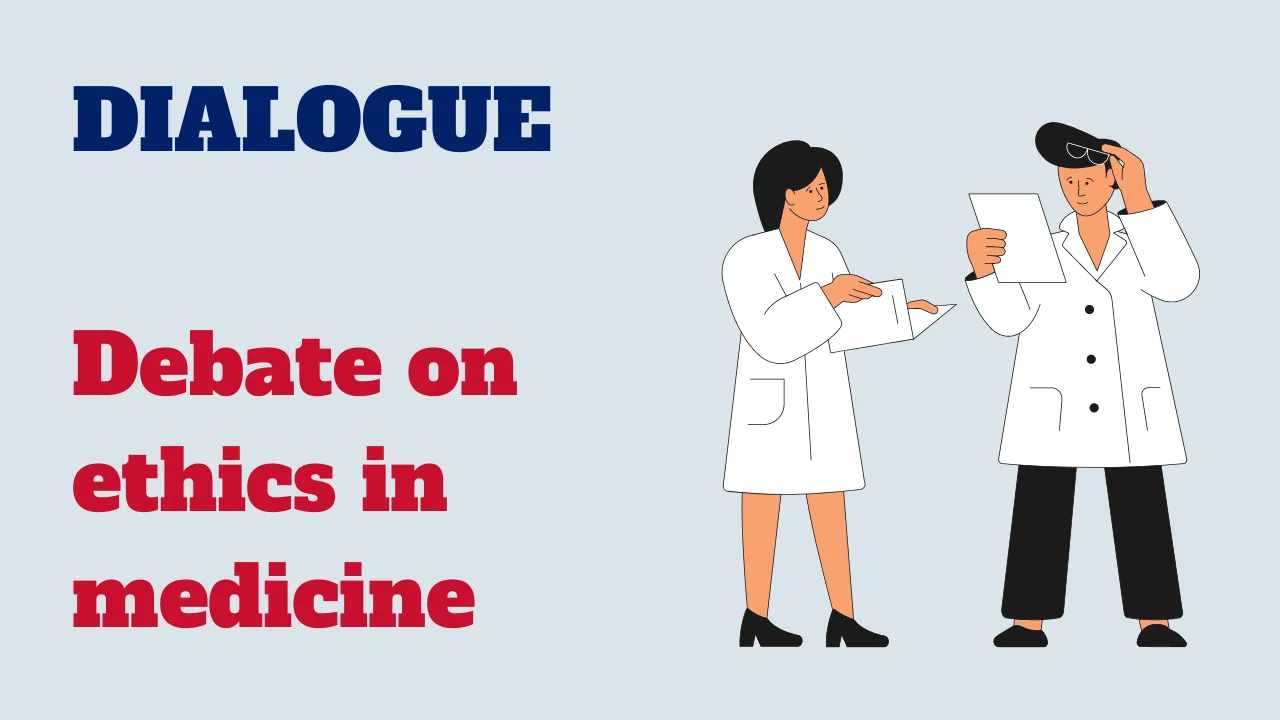Engage in a debate on ethics in medicine with this dialogue. Whether discussing patient autonomy, medical decision-making, or the allocation of resources, this conversation between two individuals will help you build your vocabulary related to medical ethics and moral dilemmas in healthcare.

Dialogue: Debate on ethics in medicine
Participant 1: Good evening, everyone. Today, we’re here to debate the ethical considerations in modern medicine. As advancements in medical technology and research continue to evolve, it’s crucial to examine the ethical implications of our practices.
Participant 2: Absolutely. One of the key ethical principles in medicine is respect for patient autonomy. Patients have the right to make informed decisions about their healthcare, including the choice to accept or refuse medical treatment.
Participant 3: While patient autonomy is essential, we must also consider the principle of beneficence, which emphasizes the obligation of healthcare providers to act in the best interests of their patients. In some cases, this may involve overriding a patient’s autonomous decision for their well-being.
Participant 4: I agree with the importance of beneficence, but we must also balance it with the principle of non-maleficence, which requires healthcare providers to avoid causing harm to their patients. It’s a delicate balance, especially in cases where treatment options carry potential risks and uncertainties.
Participant 1: Indeed, the ethical landscape in medicine is complex and multifaceted. Another pressing issue is the allocation of scarce medical resources, such as organs for transplantation or life-saving medications. How do we ensure fair and equitable distribution while maximizing benefits and minimizing harm?
Participant 2: That’s a challenging question. Utilitarian principles suggest that we should allocate resources in a way that maximizes overall utility or benefit to society. However, this approach may raise concerns about justice and fairness, particularly for marginalized or disadvantaged populations.
Participant 3: One proposed solution is the use of transparent and objective criteria for resource allocation, such as medical need, prognosis, and likelihood of success. By establishing clear guidelines and protocols, we can ensure that decisions are made fairly and consistently across different patient populations.
Participant 4: While objective criteria are essential, we must also consider the importance of compassion and empathy in medical decision-making. It’s crucial to recognize the unique circumstances and individual needs of each patient, even in situations where resources are limited.
Participant 1: I agree. At the heart of medical ethics lies the fundamental principle of compassion and human dignity. Regardless of the complexities and challenges we face, our ultimate goal as healthcare providers should be to uphold the highest standards of ethical conduct and ensure the well-being of our patients.
Participant 2: Well said. As we navigate the ethical dilemmas in medicine, let us remain committed to our moral obligations and ethical responsibilities, guided by principles of beneficence, non-maleficence, justice, and respect for patient autonomy.
Explore the ethical complexities of medicine with this debate. Practice your English language skills while discussing patient autonomy, beneficence, non-maleficence, and resource allocation in healthcare. Whether advocating for patient rights, debating ethical principles, or proposing solutions to moral dilemmas, this conversation provides a practical scenario for language learners to engage in discussions on medical ethics and moral responsibility in healthcare. Happy debating!



